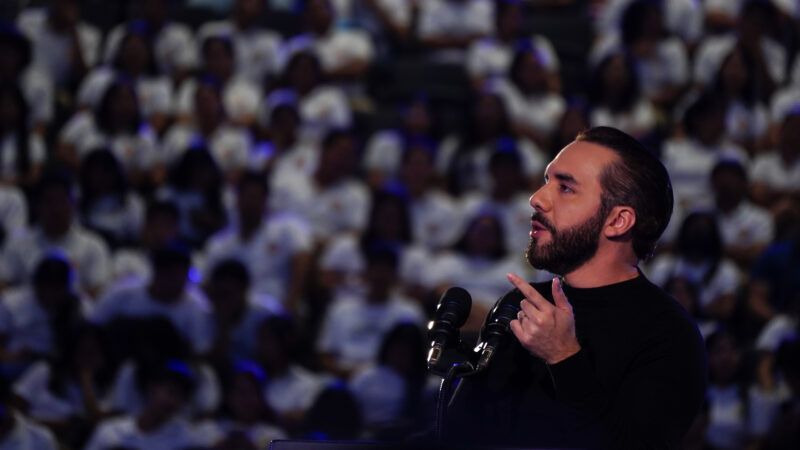El Salvador Just Made It Legal for Bukele To Stay in Power Indefinitely
With near-total control of Congress, Nayib Bukele’s party eliminated key limits on presidential power.

El Salvador's Legislative Assembly has approved constitutional changes that clear the way for President Nayib Bukele to run for reelection indefinitely.
The changes passed Thursday night with a 57–3 vote, less than an hour after they were introduced, without debate or amendments. That outcome was expected: Bukele's party, New Ideas, holds 54 of the Assembly's 60 seats, and allied parties control three more.
"Historically, reelection has been allowed in El Salvador for almost all elected positions, without prohibitions or particular conditions," said Ana Figueroa, a New Ideas lawmaker who introduced the measure. "The only exception so far has been the presidency."
The exception is now gone.
In addition to allowing indefinite presidential reelection, the reforms eliminate the second round of presidential elections, extend presidential terms from five to six years, and move the next election from 2027 to 2029 to align with congressional elections.
Figueroa claimed the changes would "foster stability, reduce costs, and increase legal certainty in order to attract investment."
Bukele, a former mayor of San Salvador, was first elected as president in 2019. He gained international attention for his aggressive crackdown on gangs and his decision to adopt bitcoin as legal tender.
Under Bukele's leadership, El Salvador's homicide rate dropped. But the cost has been steep: More than 2 percent of the country's adult population has been imprisoned under a "state of exception" that suspends constitutional rights and allows mass detentions without trial. While supporters credit his security strategy with restoring order, human rights groups have reported widespread abuses, including arbitrary arrests and the detentions of innocent people.
Bukele has worked to consolidate power since first taking office. He once marched into the Legislative Assembly flanked by armed soldiers after lawmakers blocked a funding request. He later removed Supreme Court justices and replaced them with loyalists. He has also pushed through electoral reforms that weakened political opposition.
In 2024, Bukele won reelection with 85 percent of the vote, despite a constitutional ban on consecutive presidential terms. With a loyalist court in place to reinterpret the rules, his path to reelection was cleared. Bukele celebrated his win as "a record in the entire democratic history of the world."
Meanwhile, dozens of journalists, opposition leaders, and activists have fled the country, citing harassment and threats from the government. The Los Angeles Times has called it "the biggest exodus of political exiles since the country's bloody civil war," noting that El Salvador now finds itself "in the company of other authoritarian Latin American nations, including Nicaragua and Venezuela, where dissent has been criminalized and critics choose between prison and exile."
Despite international condemnation, Bukele remains popular at home. For many Salvadorans, safety on the streets outweighs concerns about authoritarianism.
Still, the erosion of liberal norms is undeniable.
"Democracy in El Salvador has died!" said Marcela Villatoro, a lawmaker from the conservative party Arena who voted against the changes. "You don't realize what indefinite reelection brings: It brings an accumulation of power and weakens democracy…there's corruption and clientelism because nepotism grows and halts democracy and political participation."
With Thursday's vote, one of the last remaining checks on presidential power is gone. Bukele once called himself "the world's coolest dictator." The dictator part no longer sounds like a joke.


Show Comments (29)